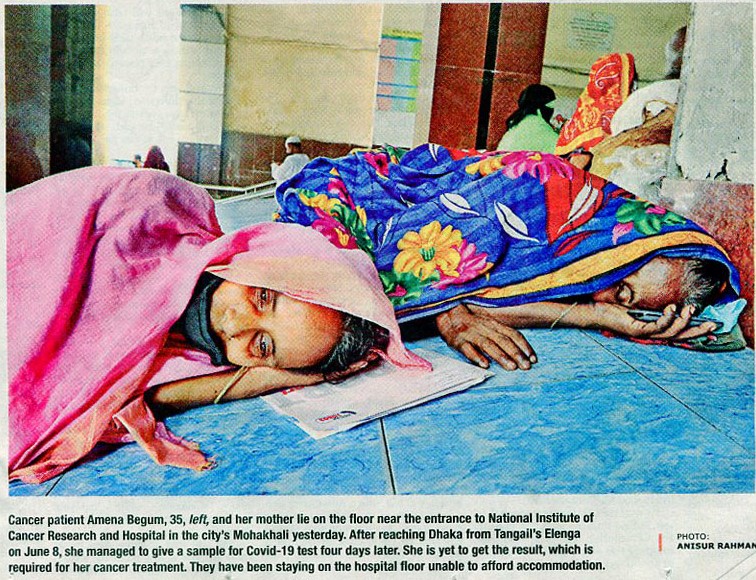
Being diagnosed with cancer is a difficult challenge at any time, but more so during the current pandemic. It’s even harder if you live in a low-income country. So, imagine that the hospital at which you expected to receive your treatment (chemotherapy or radiotherapy, for example) cannot accept you for treatment until you provide evidence of a negative Covid-19 test – but there are few designated facilities for Covid-19 testing in the country; for this you have to go another hospital, miles away, either by foot or risking exposure to coronavirus and other infections via overcrowded public transport. Once there, you have to join long queues in temperatures of up to 34 degrees centigrade and 80% humidity to receive your test. Your results might not come for days – but you have come to the Cancer Hospital in the capital from more than 100 km out of town. You have nowhere to stay and cannot afford to rent a place. Instead, you sleep on the floor of the hospital with your carer, tired, hot and unwell (see picture). This, sadly, is the reality for some patients in Dhaka, Bangladesh.
Learning of this situation and efforts by the Rotary Club of Dhaka to seek a Global Grant from The Rotary Foundation to set up a testing lab for coronavirus at the National Institute of Cancer Research & Hospital in Dhaka (NICRH), our Club decided to join other Clubs (RC of Towsontowne, MD, USA and the RC of Alexandria, VA, USA) to support the application with a donation of £1,500 which was match funded with District Designated Funds.
The Global Grant has a total budget of around $76,000, to go towards setting up the lab. Setting up such a lab is no mean feat; equipment needs to be costed, bought and installed. One RT-PCR machine alone costs over $35,000. The hospital, which is mostly used by those who cannot afford the far costlier private hospitals, treats up to 150,000 patients each year; it is estimated that the Covid-19 lab project will help up to 200 cancer patients every day, allowing them to have life-saving cancer treatment without unnecessary stress, health risks and delay.
This shows how a relatively small contribution from a club can make a huge difference. Our Club had £1,000 for international Covid-19 projects; £500 was raised from surplus dining accounts and the fundraising efforts of one Rotarian who was born in Bangladesh. (For example, she held a “Who is that baby?” competition in which members had to identify fellow members/spouses from childhood photos, she sold a number of illustrated texts that she’d handpainted, and she received donations from friends & family.)
Our Club has regular contact with the Dhaka Club. The latter has a history of supporting health projects. In fact, it set up a Rotary Cancer Detection Unit (RCDU) in Dhaka in 1980, the precursor to NICRH which it also helped set up. Over 1 million people have received treatment in the RCDU since 1980.
This is the second time our Club has helped the people of Bangladesh cope with the Covid-19 situation through the Rotary Club of Dhaka. Earlier in the year the Club donated around £3,500 to help the Dhaka Club provide basic provisions or funds to poverty-stricken rural families in areas of the country affected by the double whammy of Covid-19 and its associated lockdown and super cyclone Amphan.
In October we received the great news that the Global Grant application for the Covid-19 testing lab, on which we’re an International Partner, was successful. And just recently we received the excellent news that the project is advancing well and that the Dhaka team has managed to order all the requisite equipment. Moreover, they were able to make some savings which they’ve been able to use to address a new lab safety requirement which came into effect in October. This is excellent news and we look forward to further updates in 2021.
Picture: The initial picture which caught the attention of one of our Rotarians and led to us joining in the Global Grant application. The caption reads “Cancer patient Amena Begum, 35…and her mother lie on the floor near the entrance to National Institute of Cancer Research and Hospital…..After reaching Tangali’s [sic] Elenga on June 8, she [the mother] managed to give a sample for Covid-19 test four days later. She is yet to get the result, which is required for her cancer treatment. They have been staying on the hospital floor unable to afford accommodation”. Picture credit: Anisur Rahman/Daily Star (Bangladesh).


